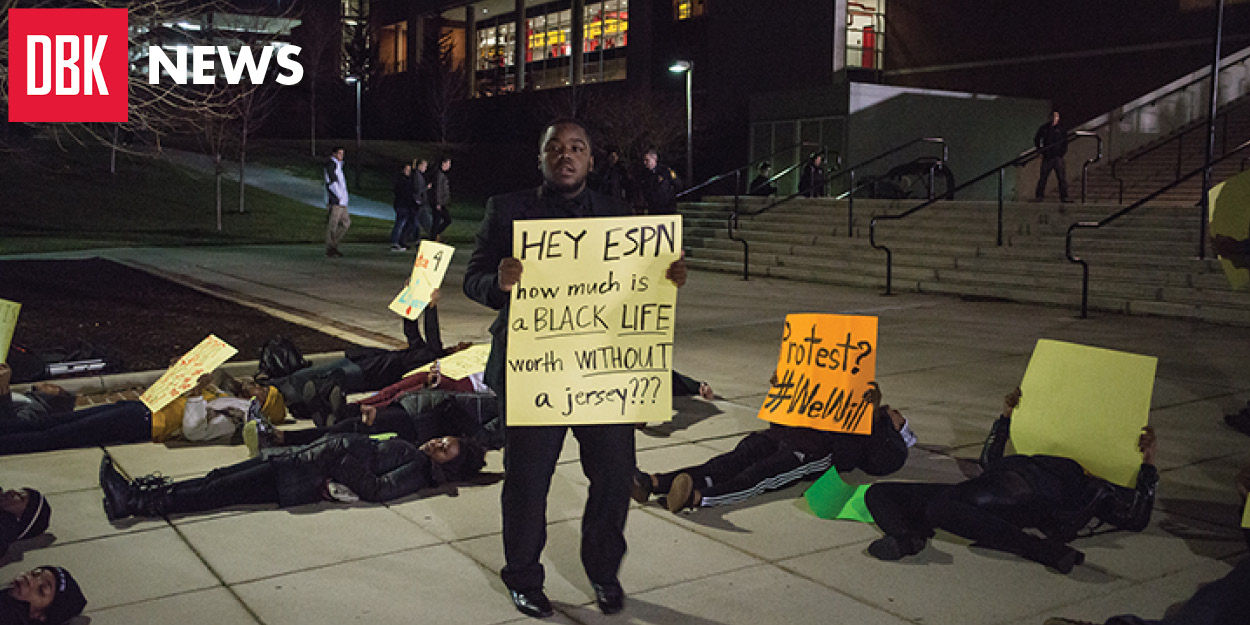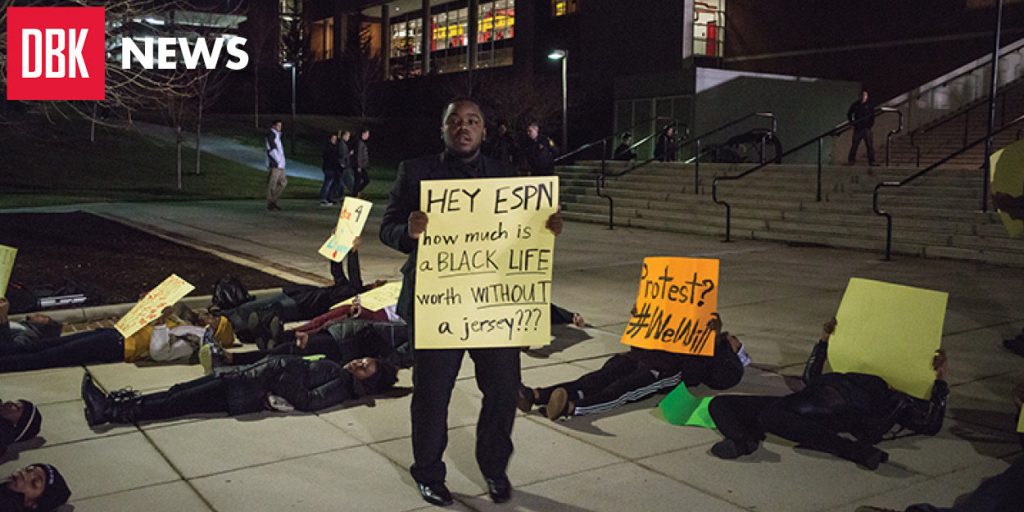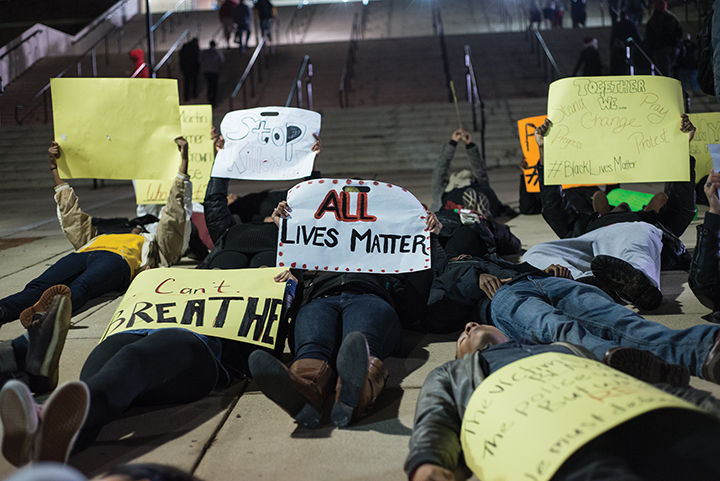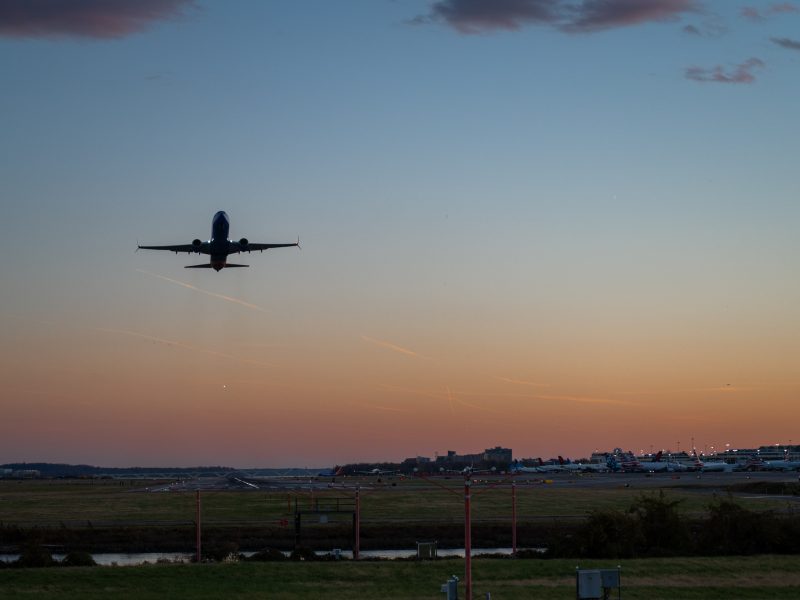About 30 protesters lay on the front steps of the Xfinity Center in 40-degree weather last night, holding signs that read, “Justice 4 Eric Garner,” “It is time to end the police brutality epidemic” and “All lives matter,” among other phrases.
The demonstration represented the hours that Michael Brown’s body laid on the street in Ferguson, Missouri, after he was shot and killed by white police officer Darren Wilson.
The activists chanted and protested as fans walked into the center for the Terrapins men’s basketball game against University of Virginia. Some of the protesters entered the game wearing all black and holding signs with slogans like “Black lives matter,” hoping to draw attention to their cause on national television.
“It seems like this country only sympathizes with black men when they’re entertaining, when they’re playing on the football field or when Lil Wayne is rapping,” said Moriah Ray, senior government and politics major and vice president of this university’s chapter of the NAACP. “The moment we open our mouths or start protesting, they want us to be quiet.”
Frustration within the community heightened after yesterday’s decision not to indict a white New York City police officer who placed a fatal chokehold on Eric Garner, an unarmed black man, during an arrest.
But for many, the issue goes beyond Garner’s death. The students’ chants echoed Garner’s name and those of other black men and boys killed by police, such as Brown, Tamir Rice and Amadou Diallo.
“This is about police brutality,” said Simone Lee, a senior mathematics major. “Police need to be held to a higher standard in my eyes.”
“Hands up, don’t shoot!” the students shouted, later chanting “I can’t breathe!” to show solidarity with Eric Garner.
Deon Long, Terrapins football senior wide receiver, held up a sign that read, “Are we still ‘thugs’ when you pay to watch us play sports? #BlackLivesMatter,” as student protesters shouted, “We are more than entertainers! We are more than athletes!”
For some, the demonstration represented a safety issue that affects them daily.
“As a black male, I’m very afraid and concerned,” said Joshua Omade, a senior cell biology and genetics major. “My life does matter; I shouldn’t be subjected to mistreatment because of the color of my skin.”
Concerns about her 12-year-old brother’s future drew Brittany Greene, a senior bioengineering major, to the demonstration last night.
“I just don’t want him to be pinpointed for the wrong reasons,” she said. “I just want him to have opportunities and not be afraid of the people who are supposed to be protecting him. I want him to believe in the justice system.”
Others came out to protest how little has changed for black people in this country in terms of dealing with law enforcement.
Lisa Ward, founder and president of The Scholarship Center Inc., participated in the demonstration and recalled being a black law student at Tulane University in New Orleans more than 30 years ago. She talked about the warnings her professors gave students about dealing with police.
“Professors took African-American students aside and said, ‘It’s “yes sir” or “yes m’am” until you’re out of custody,’” she said. “We’re still here, still dealing with the same thing. I’m over it.”
The protesters received mixed reactions from passersby heading into the game. Some showed their support by raising their hands above their heads and chanting along, while others challenged the protesters with shouts of “Read the facts” and “Obey the cops.”

Die in protest
Some who witnessed the protest on their way into the game said the demonstration was inflammatory and excessive.
“I thought it was personally over the top,” said attendee Stephon Marbury, an IT consultant from New York City.
But protests are meant to make people uncomfortable, said Jasmine Whittington, a senior journalism major and protest participant.
“The point is to get people out of their comfort zones and see there are bigger things going on,” she said.
Besides rallying publicity for their message, the students hope for a stronger reaction from university President Wallace Loh, Ray said. Loh sent an email to the university community on Nov. 25 commending students for their protests of the grand jury decision not to indict Wilson.
“We come in peace, but we do want the university to respond to us,” she said. “[Loh] encouraged discussion, but we want action.”
The NAACP and the Black Student Union are asking to have University Police officers as well as all officers in this state wear body cameras, she said. They also want the university to change the name of Byrd Stadium, named after Harry Clifton Byrd, a former university president who supported segregation in the University System of Maryland, Ray said.
University Police are in the process of equipping its police force with body cameras, department spokeswoman Sgt. Rosanne Hoaas said.
“We want to send a message to the university and the country that black lives do matter,” Ray said. “We refuse to allow this to continue to happen.”
Students holding up signs while participating in a “Die-In” by the steps of the Xfinity center during a basketball game.





